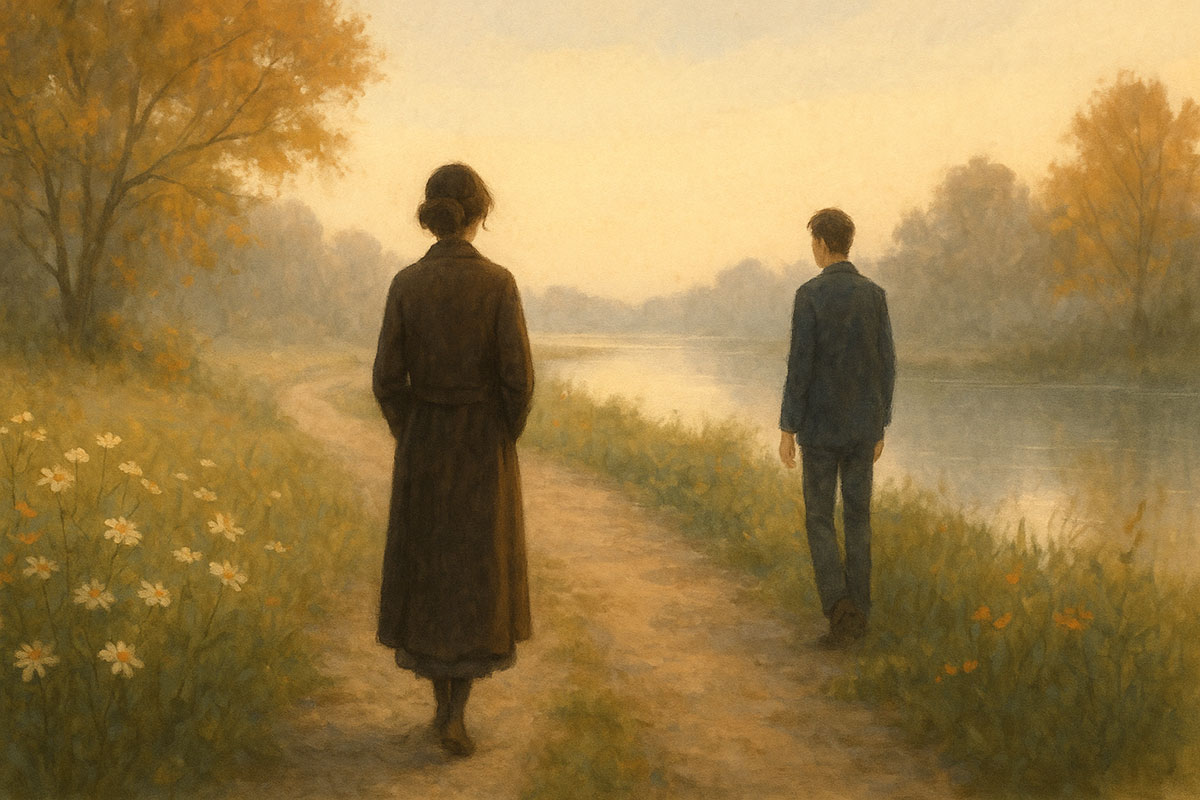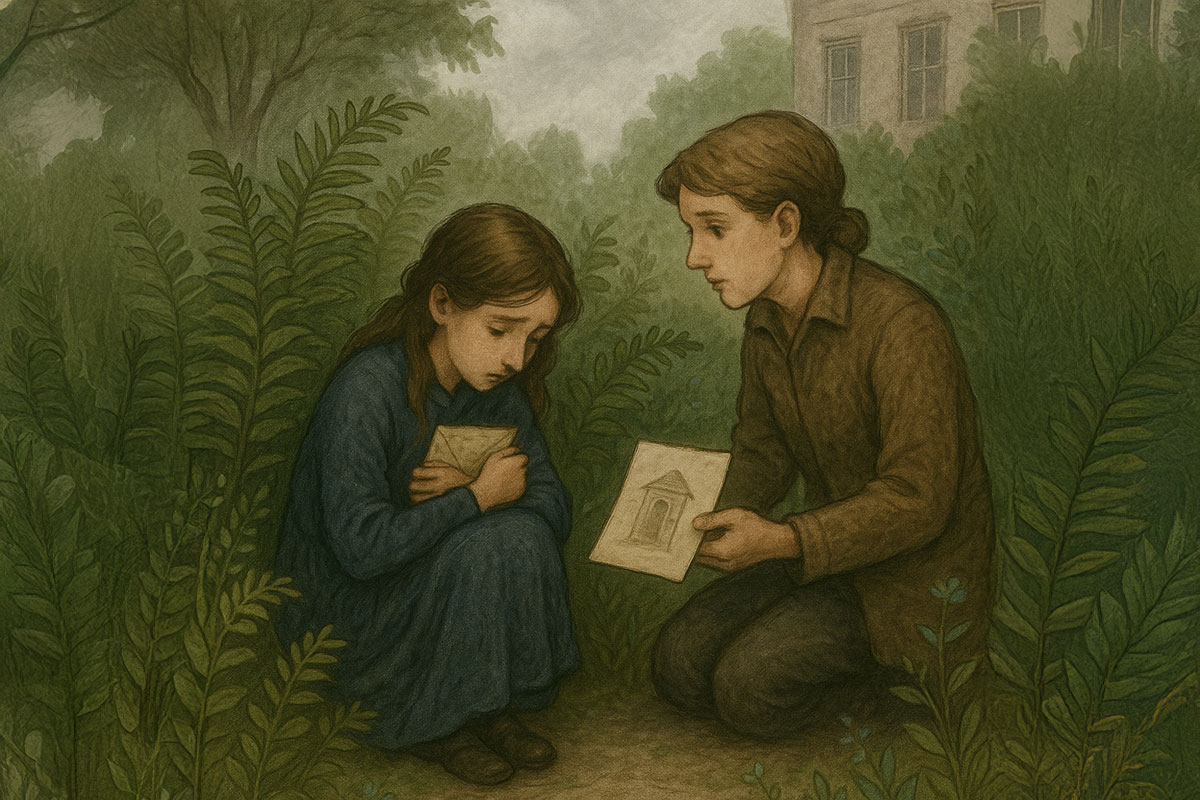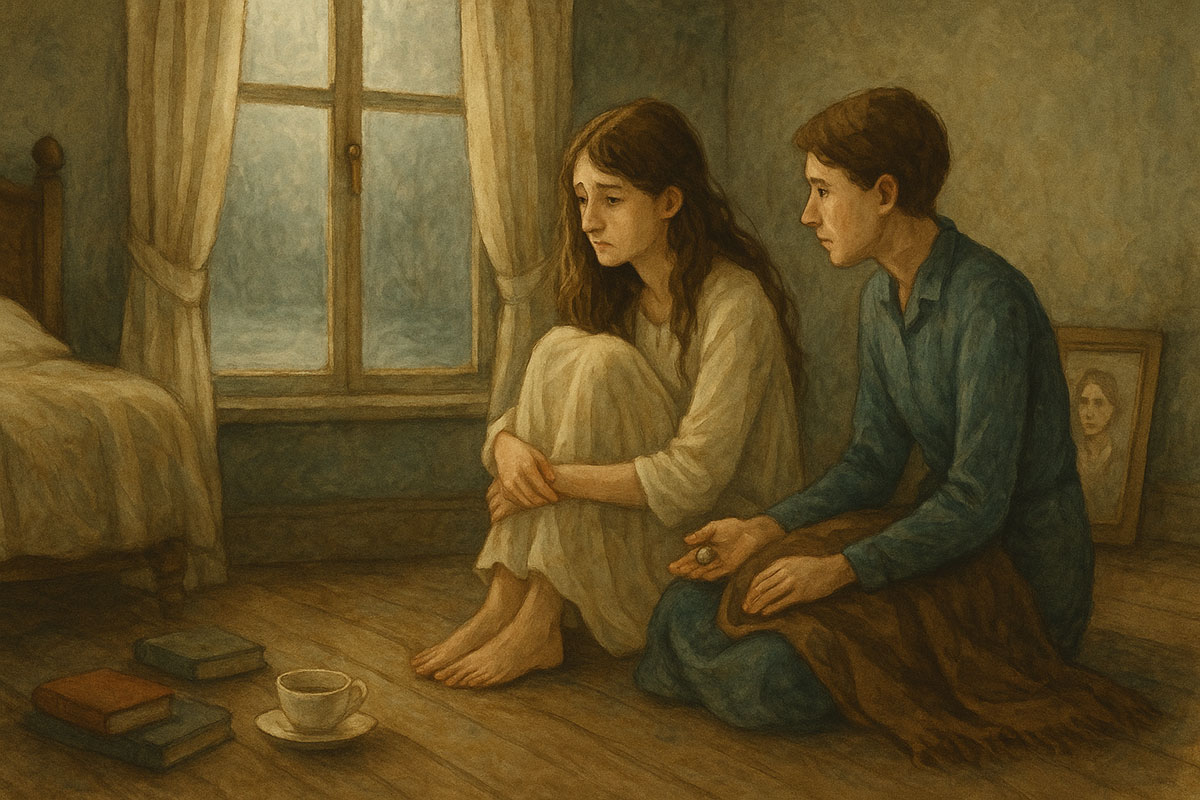
|
Getting your Trinity Audio player ready...
|

Virginia Woolf:
There are rooms within me no one enters—rooms lined with silence, rooms crowded with shadows. Yet if you are still enough, and kind enough, you may find me sitting there with the ghosts of my own making. I did not always speak aloud the things that bruised me. I wrote them into waves and walks and windowsills. I buried them in lighthouses and between the threads of moth-eaten coats.
And you, my dear friend, if you are reading this—know that you were there, even if you said nothing. You sat in the dark with me when I could no longer remember the light. You did not demand I be well, only that I not be alone. These five stories are not triumphs, nor confessions. They are traces. And you, gently, gathered them.
(Note: This is an imaginary conversation, a creative exploration of an idea, and not a real speech or event.)
Chapter 1: The Silence After the Abuse

There were two clocks in the nursery.
One ticked like a polite conversation.
The other, like footsteps coming up the stairs.
Virginia lay in her bed, still as language before it’s written.
The air smelled of lavender and soap.
The door creaked once. That was all.
He didn’t speak.
He didn’t have to.
Later, she would learn the word “abuse.”
But at thirteen, she only knew the feeling of falling upward—of leaving her body like a book knocked off a shelf.
It wasn’t pain, not exactly.
It was disconnection.
A curtain pulled between her and herself.
She said nothing.
Because that’s what clever girls did in good houses.
You found her later, in the corner of the garden, where the ferns grew tall enough to hide a child if she curled small enough.
She wasn’t crying.
She was just… absent.
You didn’t ask.
You didn’t need to.
You sat beside her with a box of raisins and a folded piece of drawing paper.
She didn’t take the raisins.
But she did reach for the paper.
On it, you’d drawn a door.
Just a plain door. A little crooked. Slightly ajar.
“You don’t have to open it,” you said.
“Just know it’s there.”
She didn’t speak for the rest of the afternoon.
The light moved across the lawn like time learning how to walk.
The bees stayed respectful. The birds didn’t sing.
At one point, she looked at you—not into your eyes, but toward the quiet space you offered. The one where nothing was demanded.
And in that silence, something happened.
Not healing.
Not justice.
But presence.
She returned to the house before dark.
Composed.
Distant.
The same.
But she took the drawing with her.
And that night, she didn’t sleep in the nursery.
She moved her blankets to the sitting room, where the lamp could stay on, and placed the folded paper beneath her pillow like a spell.
Years later, when she would write essays about “the angel in the house,”
when she would dare to name what others couldn’t say,
she would remember that door.
And how someone once drew it for her—not to be opened,
but to be known.
Chapter 2: The Death of Her Mother

The house went silent before it was announced.
Servants moved slower.
Doors didn’t close all the way.
Even the mirrors dimmed, as if grief had draped a shawl across them.
Virginia stood in the hallway, 13 years old, her hands clasped so tightly they trembled.
Her sister Vanessa was weeping in another room. Her brothers were quiet in a way boys never are unless they’ve seen something that cannot be undone.
Julia Stephen—her mother, the beautiful one, the one whose presence filled the room before she entered it—was gone.
Virginia did not weep.
Not that day.
Instead, she went to the drawing room and sat beside a teacup no one had cleared away.
You found her there, staring at the rim of the cup like it might explain everything.
She did not look at you.
“She was in the garden just last week,” she said softly.
“And now she’s… nowhere.”
You sat beside her, not on the settee, but on the floor—so your shoulder could rest against her knee like a child does with a parent.
She didn’t reach down, but she didn’t move away either.
“They keep saying she’s in heaven,” she added.
“But no one says what happens to the room she’s not in.”
You said nothing. You just placed a small pebble in her hand.
She frowned.
“What’s this?”
“Something that stays,” you said.
That night, the house swelled with black fabric and murmured condolences.
People brought flowers.
People brought cakes.
But no one brought silence.
So you did.
You returned to the garden, where the magnolia tree was still in bloom.
You sat with her behind the hedge, both of you in formal shoes caked with earth.
She looked up at the sky—not tearfully, not theatrically.
Just like someone searching for the corner of something infinite.
“I don’t think I’ll ever love anyone the way I loved her,” she said.
“You don’t have to,” you replied.
“You just have to keep speaking to her.”
She turned to you, finally. Her eyes wide.
“Even if she doesn’t speak back?”
You nodded.
“Especially then.”
That night, she wrote her first secret letter—not to a person, but to the absence.
She tucked it inside a book she would never loan out.
And for the first time in days, she slept.
Not peacefully.
But deeply.
Chapter 3: The Madness After Marriage

The doctor said she was fortunate.
A stable husband. A quiet home. Good air.
No children yet.
Time to rest.
What the doctor didn’t see was the way her fingertips trembled even when she wasn’t holding a pen.
What Leonard didn’t say—because love makes you hopeful—was that she hadn’t smiled in weeks.
Not the real smile. The half-lidded one that came when she found the right sentence, the perfect pause.
What Virginia knew, and could not say, was this:
“Something is trying to undo me from the inside.”
You came when Leonard sent the letter.
You’d known her before marriage.
Before the veil of expectation wrapped itself around her like gauze soaked in warm water.
You arrived at the house in Richmond and found her sitting on the floor, back against the wall, knees drawn up like a child hiding from a storm.
The windows were open, but the air didn’t move.
She looked up at you.
“It’s like trying to hold sunlight in a teacup,” she said.
You didn’t ask what “it” was.
You just sat beside her, knees touching.
After a long silence, she whispered,
“They say I’m recovering. But I don’t feel saved. I feel… suspended. Like a ghost that hasn’t been assigned a haunting yet.”
You offered her a spoonful of tea. She drank it without meeting your eyes.
Then she said it, very quietly:
“Sometimes I wish I had died when I tried.”
Your hand didn't flinch. Your breath didn’t catch.
You simply placed the cup down and said,
“Then I’m glad you didn’t.”
That night, you didn’t speak much.
You brought her warm socks. Read aloud without waiting for her to follow.
When she winced at the sound of a neighbor’s piano, you placed a blanket over the windowpane like it could soften the world.
She fell asleep leaning against your shoulder.
She murmured once in her sleep, the only sentence she kept from the dream:
“Please let my mind come home.”
In the weeks that followed, you visited daily.
Some days she would walk. Some days she would write.
Some days she would simply sit, staring at her own fingertips like they belonged to someone else.
You never asked her to be well.
You only asked her to stay.
And one morning, she brought you a page—not a novel, not a letter.
Just one paragraph, handwritten and uneven:
“There is a way through the fog. It is not always forward.
Sometimes it is simply not disappearing.”
You read it twice.
Then folded it carefully and put it in your coat.
Because sometimes survival isn’t a roar.
It’s a whisper answered by someone who hears it.
Chapter 4: The Crisis of Voice During To the Lighthouse

She wrote all day and then tore it to shreds.
Then started again.
Then stopped.
Then walked down to the river and stared at it like it was asking a question she wasn’t ready to answer.
“It’s not a book,” she told you.
“It’s a séance. I’m trying to bring her back, and she won’t come.”
She meant her mother.
But also herself.
To the Lighthouse was supposed to be a novel.
But to Virginia, it was a wound shaped like a house.
Mrs. Ramsay was the ghost of Julia Stephen in a linen dress.
The lighthouse was death’s outline in the distance—constant, unmoving, unreachable.
And in between?
Silence.
You arrived at her home in the late afternoon. The writing room was cold. She’d left the window open again.
She stood barefoot on the rug, eyes swollen from the inside.
On the floor: pages scattered like feathers. Notes in every margin. Crossed-out lines. Half-remembered sentences.
“I don’t know how to finish her,” she said.
You stepped over the pages and gently touched her wrist.
“You’re not supposed to.”
She sat down on the floor, the way she always did when it got too big.
“What if I can only write pain?” she whispered.
“What if the beauty always has to hurt?”
You sat beside her, cross-legged, shoulder to shoulder.
“Then write the hurt beautifully,” you said.
“So it’s not just yours anymore.”
The next morning, she didn’t write.
She walked.
Through gardens. Past hedges. Into the woods.
You walked beside her. She didn’t speak until the path turned and the sea appeared below.
She stared at it a long while.
“I remember her voice,” she said.
“But I don’t remember the last thing she ever said to me.”
You didn’t offer a substitute. You didn’t fill the silence.
Instead, you said:
“Then let Mrs. Ramsay say it now.”
She turned to you.
“Do you think she’ll sound real?”
“If she comes from your grief, she’ll sound truer than anything.”
Virginia nodded. A long, slow nod that ended with the wind in her hair and her hand closing tighter around the notebook.
She returned to the page that night.
Not to finish her mother.
But to sit with her there.
By the sea.
By the light.
By the distance between what’s lost and what remains.
And this time, she didn’t cry.
She wrote.
Chapter 5: The Final River

It was March.
The war was rumbling again, outside and inside her.
The birds had returned, but their songs sounded like mistakes in a sentence she couldn’t revise.
Virginia walked to the river that morning with heavy pockets.
Her coat buttoned neatly.
Her letter sealed.
The sky was pale and polite.
You had seen it coming.
Not in words—she had always known how to disguise pain with beauty.
But in the stillness.
The long, lingering stillness between sentences.
She’d stopped rereading her favorite books.
She’d stopped rearranging her desk.
She’d stopped finishing her tea.
And when you arrived that morning, she was already standing in the hallway, her shoes on, her hat low.
“I just need a little air,” she said.
You said,
“Then let’s walk together.”
She didn’t argue.
You walked the path slowly, side by side.
The fields were still soft from rain.
The river ahead shimmered like something remembering how to disappear.
“I feel the storm coming again,” she said.
“In my head. Like footsteps. Like soldiers.”
You nodded.
“I know.”
She didn’t look at you.
“It’s not sadness,” she whispered.
“It’s erasure. I can feel myself un-writing.”
You took her hand.
“Then let’s stay here until the page holds.”
At the edge of the river, she sat on the bank and removed her shoes.
You sat beside her. Quiet. Present.
“Do you think Leonard will forgive me?” she asked.
“He already has. He never blamed you.”
She nodded once.
Then again.
“I don’t want to be rescued,” she said.
“I just want to be remembered gently.”
“You will,” you said.
“I’ll make sure of it.”
The wind touched her cheek like a hand saying goodbye.
The river opened its arms—not as a threat, but as a release.
She stood.
You did not hold her back.
But before she stepped into the water, she turned to you and said—
“Thank you for never asking me to explain.”
You said nothing.
Because she knew.
And because some love speaks best in silence.
Later, when Leonard read the note, he wept.
You did not.
Because you had already heard her goodbye in the wind.
And her voice still lingered—in waves, in words, in every page she had left behind.
And in your coat pocket, folded and worn, you carried the first drawing you ever gave her:
A door.
Slightly open.
Final Thoughts by Virginia Woolf
I have often wondered if the soul has tides, and if so, whether we drown because of the sea or because of our refusal to let go. I stood many times at the edge of things—grief, madness, language—and you did not pull me back, nor push me forward. You stood with me. And that, perhaps, is the great mercy of friendship: not its cure, but its company.
If I am remembered at all, let it not be for drowning, but for listening—to the subtle music beneath thought, the unsaid truth between lines. And let it be said: even in the last chapter, someone sat beside me, not to fix me, but to see me. That was enough. That was everything.
Short Bios:
Virginia Woolf
A British modernist writer and thinker, Virginia Woolf (1882–1941) is known for her lyrical stream-of-consciousness novels such as Mrs Dalloway, To the Lighthouse, and The Waves. She was a pioneer of feminist literature and mental health advocacy through art. Despite lifelong struggles with depression and trauma, she left a legacy of profound insight into time, memory, and the inner life.
Leonard Woolf
A political theorist, publisher, and Virginia’s husband, Leonard Woolf was her steadfast supporter and caregiver. Though quiet in public, his private life was filled with quiet acts of devotion. As co-founder of the Hogarth Press, he helped publish many of Virginia’s works and others that reshaped 20th-century literature.
Vanessa Bell
Virginia’s older sister, Vanessa Bell was a painter and member of the Bloomsbury Group. Emotionally grounded and fiercely protective, Vanessa was both a creative influence and a maternal presence in Virginia’s life. Her home, Charleston, was a refuge and an artistic haven for the family.
Lytton Strachey
An eccentric and brilliant biographer, Lytton was a close friend and frequent conversational sparring partner of Virginia’s. With sharp wit and emotional honesty, he challenged conventional morality and shared a deep intellectual bond with her, often discussing literature, death, and desire.
You (the friend)
In this story series, you are the constant: a gentle, witnessing presence across Virginia’s darkest hours. You offer no corrections, only compassion. You appear in moments when silence is the only safe language, holding the lantern she cannot carry alone.

Leave a Reply